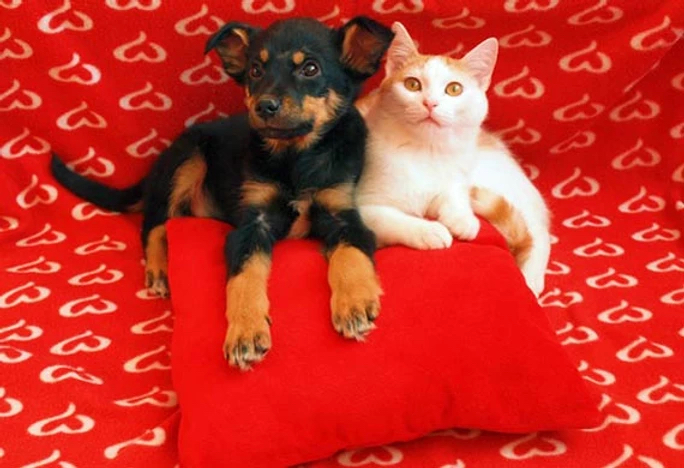Valentine's Day For Your Fur Baby: Exactly Why They Need To Forego The Chocolate...

Ok, it's Valentine's Day.
We're all in a loving frame of mind - whether for our significant other, our "valentine" or BFF, or the cutie who sits in the back of the classroom - we have hearts, roses, special dinners, and of course chocolate, on the brain. As we shower our loved ones with that little something extra, we also want to indulge our four-legged furballs who give us the best kind of love: unconditional.
But! Valentine's Day cards? Our pets can't read (even though in our minds they can!) so they give it a little sniff then it goes on the mantle. Roses? Mm…they're fragrant and beautiful for us to look at but even a small, curious nibble is a bad idea for "Fluffy." Chocolates? Ok. We all know the general answer to that - chocolate is bad for dogs and cats. However, do you really know why? Or, what actually happens if your pet gets a hold of your heart-shaped box of candy? Here's a quick guide to making Valentine's Day SAFE, and special for your fur babies.
Why Chocolate Is Bad For Pets
We all know it and hear it, but some aren't completely clear on why. We automatically think of caffeine, but the truth is caffeine is mainly sourced from coffee beans and seeds (which is also a big "No! No!" for pets) and is part of the issue. With chocolate, the main toxic property is actually Theobromine. Theobromine comes from cacao, or cocoa plants, and is very similar to caffeine but has one less molecular group than caffeine.
Trust me, we were having nightmare flashbacks to 8th-grade chemistry as well!
That extra molecular group is what makes caffeine stimulate the central nervous system, stimulate cardiac and skeletal muscles (you know, the muscles that help us and our pets move), and relaxes the smooth muscles (stomach, bladder, intestines).
Hang tight…the science lesson is almost over.
Caffeine = 3 affects (technically 4)
- Stimulates the central nervous system
- Stimulates cardiac and skeletal muscles
- Relaxes soft muscles
Theobromine = 2 affects
- Stimulates cardiac
- Relaxes soft muscles
What If My Dog Or Cat Gets Their Paws On Chocolate (Or Caffeine)
First thing's first - call your vet immediately! But to put your mind at ease here is a Chocolate Toxicity Calculator that will help determine the level of toxicity your pet will experience based on what they ate. We like this one because of the feature when you're not sure of the amount of chocolate ingested.
Another good one is from VetCalculators. This one includes entering the options of coffee beans or grounds to determine the toxicity level. There are others out there, but these are two we like for their additional features.
Also, signs to look for that will occur within 24 hours of ingestion are:
- Vomiting
- Diarrhea
- Increased body temperature
- Increased reflex responses
- Muscle rigidity
- Rapid breathing
- Increased heart rate
- Low blood pressure
- Seizures
- Advanced signs (cardiac failure, weakness, and coma)
Giving Your Fur Baby Extra Love For Valentine's Day
What better way to shed some extra love and thanks for their unconditional love, than with some homemade treats! Here's a recipe for some quick, easy, and yummy chicken treats for your pup, or sweet, lip-smacking treats made with peanut butter.
For the fluffy feline in your life, try your hand at these cheesy treats that will have them begging for more.

